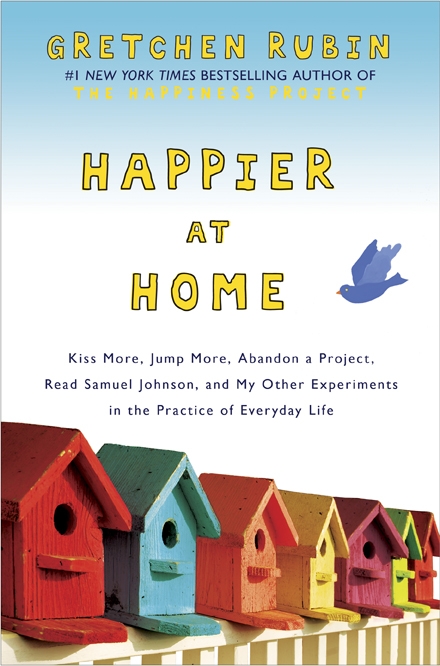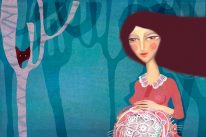
Note: The winners for this giveaway have already been chosen! Subscribe to Tiny Buddha for free daily or weekly emails and to learn about future giveaways!
The Winners:
There are certain people who become part of the fabric of our culture. Their work touches something primal in all of us, and compels us to think and act differently in a way that improves life for us, and the people around us.
Gretchen Rubin created such a phenomenon with The Happiness Project, her account of the year she spent test-driving ancient wisdom, current scientific research, and lessons from pop culture about increasing happiness.
At the core of all our desires is the desire to be happy, and yet it can seem so elusive. The very act of searching or striving for it can negate it, if we focus so intently on creating happiness in the future that we distract ourselves from happiness in the present.
That’s part of what I appreciate about The Happiness Project. It’s not about making major life changes, pushing for a better life tomorrow. It’s about tuning into the little things that make life better today.
In her latest book, Happier at Home, Gretchen follows the same formula from her first happiness book, focusing on relationships, possessions, and issues that pertain to life at home.
What I most respect most about Gretchen is that she’s fearless in sharing herself honestly—quirks, weaknesses, and all. She acknowledges that this is crucial to her happiness, since she can build a happy life only on the foundation of her own nature.
I find this type of self-awareness and self-acceptance admirable and inspiring.
I’m grateful that Gretchen’s offered to give two free copies of Happier at Home to Tiny Buddha readers.
The Giveaway
To enter to win 1 of 2 free copies of Happier at Home:
- Leave a comment below
- Tweet: RT @tinybuddha Book GIVEAWAY & Interview: Happier at Home http://bit.ly/O85F4p
If you don’t have a Twitter account, you can still enter by completing the first step. You can enter until midnight PST on Sunday, September 22nd.
The Interview
1. In your new book, you wrote about happiness as it pertains to your home life. What made you decide to focus on this aspect of happiness?
I realized that for me, and for many people, many of the elements of a happy life converge in the idea of “home.” Time, possessions, body, marriage, parenthood, neighborhood…home is the foundation.
2. What’s the most important thing you learned about happiness in relationships in the month you focused on improving your marriage?
If I want the atmosphere of my marriage to be tender, attentive, and romantic, I need to be that way myself. And the only person I can change is myself—but when I change, a relationship changes.
3. In the chapter on parenthood, you wrote about the power of under-reacting. Can you tell us a little about that, and how it affected your happiness?
It’s easy to get very worked up about relatively minor issues (I do have a tendency to fly off the handle). By reminding myself to under-react, I keep myself—and everyone else—calmer. Usually, I found, my operatic response was unwarranted!
4. As a fellow blogger, I was particularly interested in your section on “the cubicle in your pocket,” relating to technology. What was the most helpful practice you employed to improve your focus?
At certain points, I disconnect and don’t check my email or any online thing. When I need to do intense research and writing, I work in a library, where I never connect to the Internet. Being in that space helps me concentrate.
5. In your research, did you find any pieces of conventional happiness wisdom to be ineffective in improving your happiness?
I found keeping a gratitude journal to be an annoying exercise. That just did not work for me.
6. Did you discover something about your happiness that surprised you?
That for me, and for many people, outer order contributes to inner calm, more than it should. In the context of a happy life, an over-crowded coat closet or an overflowing in-box are trivial matters, but somehow, getting control over the stuff of life makes me feel more in control of my life generally. I feel more energetic, more creative, more cheerful.
7. What’s next for you? Is there another happiness book in your future?
I do know what book I’m going to write next, but I feel superstitious about it, so am not revealing it yet…except to say that it’s highly related to happiness, though not exactly about happiness, and it’s a FASCINATING topic!
Learn more about Happier at Home on Amazon.
FTC Disclosure: I receive complimentary books for reviews and interviews on tinybuddha.com, but I am not compensated for writing or obligated to write anything specific. I am an Amazon affiliate, meaning I earn a percentage of all books purchased through the links I provide on this site.
About Lori Deschene
Lori Deschene is the founder of Tiny Buddha. She started the site after struggling with depression, bulimia, c-PTSD, and toxic shame so she could recycle her former pain into something useful and inspire others to do the same. You can find her books, including Tiny Buddha’s Gratitude Journal and Tiny Buddha’s Worry Journal, here and learn more about her eCourse, Recreate Your Life Story, if you’re ready to transform your life and become the person you want to be.
- Web |
- More Posts













 Though I run this site, it is not mine. It's ours. It's not about me. It's about us. Your stories and your wisdom are just as meaningful as mine.
Though I run this site, it is not mine. It's ours. It's not about me. It's about us. Your stories and your wisdom are just as meaningful as mine.
count me in for the give away luck! 🙂
Love both of your blogs and would love to win :))
Nothing can be more true — “And the only person I can change is myself, but when I change, a relationship changes.”
I’ve been trying to live by this one simple line for the past few months and boy! This exercise does make me realize how easily forgetful i can get at times!!!
Way to go Gretchen for making this a part of your everyday happiness! I’d love to get my hands on your book to help me succeed in my goal! 🙂
Have a happy day at home today! 😀
Would love this one!
Inner happiness allowed new love into my life and with that comes inner peace, how to maintain and grow this when I evenutally live with my partner? How can we have a happy home and happy life together
Need to learn to under-react!
I read The Happiness Project and would love to read this one too! Thanks for the chance to win a copy.
I would love to read this! Thank you!
Excited to read this book!
I would love to win a copy! Thanks!
Would love a copy as well! I have the first book and it was a great read. 🙂
Great opportunity; thank you.
What a great giveaway! Would love to read it.
would love to win a copy!
I realized a while ago that my response to “How are you?” is always just “Fine”. I want to be more than fine, better than fine! I just got “The Happiness Project” last week, and have been tearing through it. My plan is to re-read it again slowly to build my own lists and structure. While I don’t have a husband or kids, receiving a copy of “Happier at Home” will help me to further consider all of my relationships and the paths I’ve created over time (mostly by default!). Times they are a’changing…
Would love to win!
I would be ecstatic to win a copy!
This looks like a fascinating book and I look forward to reading it and sharing it with others.
Great interview. Would love to read.
Once again, I’m reminded there are no coincidences! This book keeps popping up!?!?!
Would love to be happier at home! Love from miserable at home x
Loved her first book. Would love to win this one.
This book ‘speaks to me’ and I would love to win a copy and read it!
this is the first time I hear of these books – LOOK FORWARD TO READING THEM – thank you TINYBUDDHA for the intro and all of your meaningful blogs!!
I’m not entirely sure happiness is based on control. Control over anything is an illusion.
Would love to read this!
Quite essential
I would love to read this book, sounds incredible from the interview. Always looking to add to my inspiring book collection. Hopefully I’ll win so I can share the inspiration with others! 🙂 Thanks Lori!
Anxious to get my hands on this book! The interview was inspiring.
This sounds like a wonderful book to read and share!
I read the Happiness Project and i have to say it was awesome! It shows you how to find happiness in the little details and how you need to make some changes to achieve it. Greate interview by the way. 🙂
I Loved reading the Happiness Project, can’t wait to read this too 🙂
I would love to read this!!
I’ve been doing this sort of ‘test-driving’ of assorted wisdoms myself for the last year or so….would love to have a copy of the happiness project to see how my experience compares!
I would love to read this book, and enjoyed the interview. The concept of “being” in a relationship the way I want the relationship to be really has proven to be effective. It creates a completely different and constructive dynamic. I also like the concept of “under-reacting,” which is useful for relationships of all kinds- not only parenting.
Amazing!
Thanks for the opportunity win this book.
Have been reading and loving Gretchen’s daily “happiness” posts on Facebook…some I need to plaster on my forehead 🙂 Thanks for sharing your experiences!
I would love to have a copy of Happier at Home. I am going through a divorce and trying to find as much positive energy as possible. I live with a couple that do have issues (as most couples come across). I would much rather have something positive to feed back to them so that we have a happier home and they are able to grow closer together instead of further apart as they recently just got back together from a 5 month separation. This is my first time alone in my life. I went from one marriage to another and find I sometimes struggle as 23 years of always having a husband there to lean on. I am realizing that I am never alone in this journey…but have discovered that I can travel the roads I have been on…when I once thought that I would be stuck in the ditch waiting for someone to come along and pull me out. I actually found the strength, courage, faith, support to pull myself out once my vision cleared and I could see that I didn’t need a hand or an anchor…I just needed to believe in myself.
This book is exactly what I need right now!!!
I could use some happiness!
Really liked the happiness project….would love to read this one.
Amazing… Would love to win!
I practice focusing on making time for what really makes me happy, like hugging my partner, and less time focusing on the dust bunnies.
I so need this book in my life , with an auric son, health issues for. Myself our home is not the happiest place to be
Very excited to look into this.
I’m so excited to read this! I have been looking for small ways to feel more happy as I go through a tough and stressful time in life. I think this would help me lift my head higher and keep moving forward!
This is exactly what I need! I have been working on making my home a simpler, happier place…but for so many years it was not. It is laborious work, but I am liberating myself one bit at a time.
I would love, love to read this it seems to me that it is always the hardest to make changes closest to home!
I.WANT.THANKS.^_^